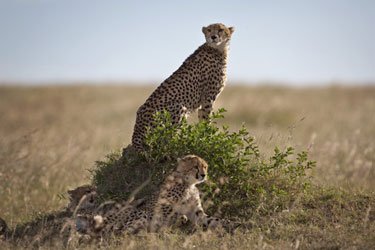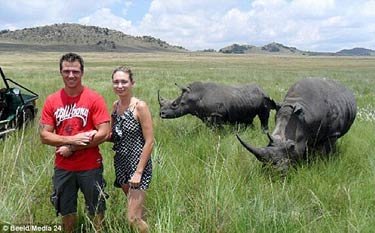Leftie Journalist Takes Two-Month Safari Guide Course (And Then Sends Management a Stern Letter of Complaint)
Big Game Hunting, Left Think, Rachel Aspden, South Africa

Rachel Aspden, tattoos and all.
God! how I detest narcissistic, self-important, leftist-conformist scribbling members of the international urban community of fashion. Heads inserted deeply up their fundaments, they go busily around the entire world applying their warped, twisted, and fundamentally wrong aggrieved-victim’s-eye-view of everything, then they insist on telling us all about it, in the process appointing themselves dictators-of-the-universe with every intention of imposing revolutionary change to everything they touch.
This Rachel Apsden is a sort of professional journalist chick, who studied Arabic in Cairo, and who in 2017 published her one big book, Generation Revolution, an account of the failed Arab Spring revolution “from the front line between tradition and change,” as shown through the viewpoints of four young Egyptians.
But, the role of wise, judgmental journalist rooting for change, man! was not enough, evidently. Off goes Rachel to South Africa to enroll in a two-month course qualifying her as a White Hunter/Safari Guide.
I wasn’t a guy, I had no idea how to use a gun, and the only wild dogs anywhere near my own home were part of a research project at London Zoo. But I was learning to change the tires on an old Land Cruiser and memorizing the birth weight of hyena pups because, at thirty-seven, I had burned out. I had just spent several years living in Egypt, reporting on the 2011 revolution and the cruelty and suffering of its aftermath. When I returned to work in the UK, I was angry, heartbroken, and guilty at being able to leave. Though my life in London was safe and easy, as I went through the motions of commuting and sitting in the office, everything felt dark. That was when the dreams began: huge open spaces, empty skies, light—places I’d seen when I’d visited friends in South Africa. That wild nature felt like a lifeline, something I could believe in as an absolute, uncomplicated good, a unifying and healing force that was somehow separate from the moral tangles created by humans. I didn’t think about where these beliefs had come from.
It seems unlikely that she intends to do any Safari guiding though. What this is about is judgmental and condescending tourism with an article in the New York Review of Books, to be followed by the second big book, as the real goal.
Her chief insight seems to have been that her instructors were unconsciously sexist and racist, and unreasonably resentful at finding themselves “at the bottom of the pile” in today’s South Africa.
Rachel knows better. She understands that any White Presence in Africa and Apartheid were terrible Wrongs, and Big Game Hunting a highly questionable part of the Culture of Masculine Machismo and Colonialism. Native Africans were treated unequally. Atonement is due.
“Black Africans just aren’t interested in nature,†a white South African student said, as we sat by the campfire one night. We’d been talking about how dominated the country’s safari industry still was by white people, who owned and managed most of its private reserves, and made up the vast majority of guests. “It’s not PC to say it, but it’s true.â€
Bit by bit, I pieced together the true nature of the land I was hiking and driving over every day. It was an Apartheid-era cattle farm that its owners had designated a game reserve in the 1990s when foot-and-mouth disease made beef farming unprofitable, and the law changed to allow landowners to “ownâ€â€”and therefore benefit from—wildlife. However wild it looked, it was as carefully managed as any London park: the conservation manager showed us his spreadsheets recording the number of animals on the reserve, each species kept in a precise balance with the others in rounds of buying, selling, and culling. As in the Kruger and Botswana’s reserves, elephants, which multiplied quickly thanks to the artificial water sources, posed a problem no one quite knew how to solve.
I admired the reserve owners’ efforts to rewild land that had once been exhausted by intensive farming: uprooting invasive vegetation, reintroducing wildlife, clearing the detritus of old fencing and machinery. This was the story of many South African protected areas (and a reason that some wealthy tourists dismissed the country as “not wild enough,†preferring the remote wildernesses of Zimbabwe and Botswana). But as elsewhere, the land’s human history was obscured. Empty, untouched wilderness was what tourists wanted to see, and this was the illusion the safari industry aimed to recreate.
It wasn’t the only hangover from the days of empire. Guides weren’t simply responsible for providing expert knowledge and ensuring their guests’ safety. They were also expected to administer first aid, mix drinks, change tires, host dinners, clean vehicles, defuse complaints, and assist their guests in every way. Our textbook offered blunt advice on everything from hosting what it called “Oriental clients†(“Do not call the Japanese ‘Chinese’ and vice versaâ€) to dealing with a client’s corpse (“Under no circumstance may the body be transported by the vehicle used for transporting other clientsâ€). Part of our training was to entertain our “guests†on each drive we led, serving up drinks, snacks, and small talk from behind a folding table.
I wondered whether these expectations began to explain the weirdly fluctuating sense of bravado and victimhood that seemed to dog our instructors. Part of it was economic. Guides worked in a luxury industry, but the majority of them were paid very little. A single night at a high-end safari lodge in South Africa could cost $2,000 (including game drives, but excluding French champagne), but the monthly wage of a guide might be less than a quarter of that, with the workers living in basic rooms hidden from the luxurious guest accommodation, working three-week stretches without a break.
Spending your days fixing 4x4s and tracking lions was also a way of avoiding some of the troubling consequences of being a white South African in general, and an Afrikaner in particular. One was the trappings of middle-class life in a high-crime country: the electrified fences and rapid-response signs, guard dogs, window-bars, and lockable internal gates that made me feel caged and edgy when I stayed in Johannesburg or Cape Town. Once past the fortified outer boundary of the game reserve, all these disappeared—along with much of the impact of the Black Economic Empowerment policies that the company official had alluded to, under which non-white South Africans were preferred for most business and employment opportunities. The safari industry, like agriculture and wine farming, had been shaped by historical patterns of land ownership and perceived expertise. At its senior levels, white men still faced little competition.
But the most significant escape, I thought, was probably psychological. In democratic South Africa, to be a member of the minority that had implemented Apartheid was to find yourself in a particular psychic bind. That uncomfortable sense wasn’t one of identity alone: pre-1994 South Africa had made military service compulsory for white young men, and now and again, the older instructors alluded in half-sentences to serving in the army or draft-dodging in small towns along the southern coast.
Although they seemed to have little compunction about the language they used toward others, these men were acutely resentful of even the possibility of being thought racist. When they taught us Zulu or Shangaan animal names, or explained how “local people†harvested honey from mopane trees, I understood that they saw themselves as liberal. And by the standards of the Afrikaner community, which tended to be socially, religiously, and politically conservative, they could well have been right. I thought of the small farming towns I’d driven through in the remote Northern Cape, where everyone seemed to drive Toyota Hilux pickups and listen to Afrikaans country music, and I saw signs for the controversial right-wing pressure group AfriForum, which focused on the ownership of farmland that lay at the heart of Afrikaner national identity. …
Though we had complained both to the staff members themselves and to company management, the behavior and demeanor of the instructors didn’t change, and Dionne and I spoke often about leaving the course. In the end, we resolved to qualify as guides. Perhaps, we thought, we could eventually help to change the industry. After studying and training every day for two months, we took our exams: drawing diagrams of katabatic and berg winds, describing the flagship species of the succulent karoo biome, and discussing the action of neurotoxic venom. Each of us then had to guide a four-hour game drive, with David as our assessor. I sat beside Dionne in the front of the 4×4 as she led her drive; later in the day, she did the same for me. We were both passed as competent to lead 4×4 safaris in dangerous game areas. When we returned to London and New York, both of us submitted detailed written complaints to the company.








